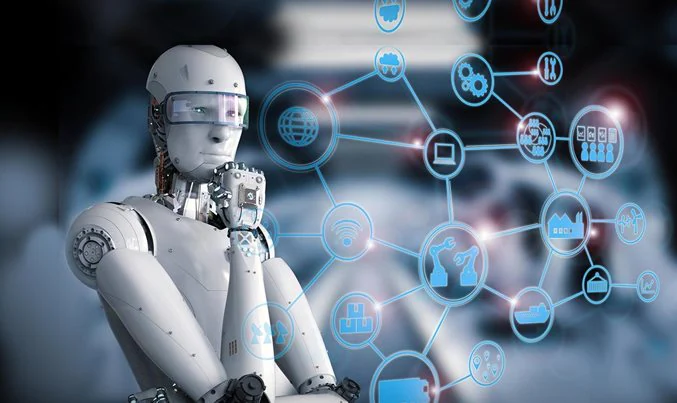
Introduction to Artificial intelligence, and How Does it Work?
Introduction to Artificial intelligence (AI) is becoming increasingly important, with applications ranging from healthcare to education. But what exactly is AI, and how does it work? This blog post will discuss the basics of Artificial Intelligence, exploring its definition, key concepts, and applications. We’llWe’ll also discuss the ethical implications of using AI and how it can be used for the greater good. By the end, you should better understand what AI is and how it works.
Table of Contents
ToggleWhat is Artificial Intelligence?
Artificial intelligence is a computer science and engineering field focused on creating intelligent agents and systems that can reason, learn and act autonomously. AI research deals with the question of how to build computers that are capable of intelligent behavior.
In practical terms, AI applications can be deployed in various domains, including search, natural language processing, planning, robotics, and machine learning.
What are the Different Types of Artificial Intelligence?

There are four primary types of artificial intelligence:
1. Reactive machines
These are the most straightforward AI systems which can only respond to the immediate environment and need the ability to store memories or learn from past experiences. The best example is Deep Blue, the computer that defeated world chess champion Garry Kasparov, in 1997.
2. Limited memory
This AI system can remember and use past experiences to inform future decision-making. For example, a self-driving car might use its limited memory to recall a previous pothole experience to avoid it in the future.
3. Theory of mind
This is a more advanced form of AI that involves understanding human emotions and intentions to better interact with people. For example, Siri and other virtual assistants use the theory of mind principles to carry out human-like conversations.
4. Self-awareness: This is the highest level of AI possible and requires a machine to know its existence and consciousness. As of now, there are no fully self-aware artificial intelligence systems.
How Does Artificial Intelligence Work?
Artificial intelligence (AI) is a branch of computer science that deals with designing and developing intelligent computer systems. AI research deals with the question of how to create computers that are capable of intelligent behavior.
To answer this question, AI researchers have developed several approaches, each with strengths and weaknesses. The three most common approaches are rule-based systems, logic-based systems, and neural networks.
Rule-based systems are the simplest form of AI. They use a set of rules to determine what actions to take in any given situation. This approach is limited by the fact that it can only handle cases that the designer of the system has specifically anticipated.
Logic-based systems are more complex than rule-based systems. They use mathematical logic to represent knowledge and reason about problems. This approach is more flexible than rule-based systems, but it can be challenging to design logical representations for complex domains such as natural language understanding or medical diagnosis.
Neural networks are artificial intelligence inspired by the brain’sbrain’s structure and function. Neural networks are composed of many interconnected processing units, or neurons, which can learn to recognize input data patterns. This approach has proved successful in many areas, such as image recognition and machine translation, but it can be challenging to understand how neural networks work internally.
Applications of Artificial Intelligence
There are many potential applications for artificial intelligence (AI). Some of the most promising applications include:
Healthcare: AI can be used to help doctors diagnose diseases, plan treatments, and predict patient outcomes.
Law: AI can assist lawyers in research, document review, and predictive modeling of legal outcomes.
Finance: AI can be used for financial risk analysis, fraud detection, and portfolio management.
Transportation: AI can be used to optimize routes and schedules for transportation networks, as well as to manage traffic congestion and autonomous vehicles.
Manufacturing: AI can be used for quality control, yield optimization, and process optimization in manufacturing.
Retail: AI can be used for inventory management, demand forecasting, targeted marketing, and customer service.
The Future of Artificial Intelligence
Undoubtedly, artificial intelligence (AI) is rapidly evolving and becoming more sophisticated every day. With the rapid expansion of AI capabilities, businesses and individuals are beginning to reap the benefits of this transformative technology.
However, as AI continues to evolve and become more integrated into our lives, it is essential to consider the future of this technology and how it will impact our world.

Some experts predict that AI will eventually surpass human intelligence, leading to a future where machines can autonomously handle all tasks, leaving humans free to pursue other interests. Others believe that AI will augment human intelligence rather than replace it, resulting in a symbiotic relationship between man and machine.
Regardless of which future comes to pass, there is no doubt that AI will have a profound impact on our world. As we continue to develop this technology, it is essential to consider the implications of its growth and how we can use it to benefit humanity.
conclusion
In conclusion, artificial intelligence is a branch of computer science that deals with creating intelligent agents, and systems that can reason, learn, and act autonomously. Artificial intelligence has been used in various fields, including medical diagnosis, stock trading, robot control, and law.

